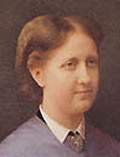 |
Isabel
b. 29 Jul 1846, Rio de Janeiro, Brazil
d. 14 Nov 1921, Château d'Eu, France |
| Title: |
Princesa Imperial Regente (Imperial Princess Regent) |
| Term: |
25 May 1871 - 30 Mar 1872 |
| Chronology: |
15 May 1871, Regency Act promulgated |
| |
20 May 1871, oath of office taken before the General Assembly (the Senate and the Chamber of Deputies meeting jointly), held at the seat of the Senate, Rio de Janeiro |
| |
25 May 1871, assumed regency upon the departure of Emperor Pedro II |
| |
30 Mar 1872, Pedro II resumed authority on his arrival to Brazil |
| Term: |
26 Mar 1876 - 26 Sep 1877 |
| Chronology: |
20 Oct 1875, Regency Act promulgated |
| |
26 Mar 1876, assumed regency upon the departure of Emperor Pedro II |
| |
26 Sep 1877, Pedro II resumed authority on his arrival to Brazil |
| Term: |
30 Jun 1887 - 22 Aug 1888 |
| Chronology: |
30 Jun 1887, assumed regency upon the departure of Emperor Pedro II |
| |
22 Aug 1888, Pedro II resumed authority on his arrival to Brazil |
| Names/titles: |
Original name: Isabel Cristina Leopoldina Augusta Micaela Gabriela Rafaela Gonzaga; Princesa Imperial (Imperial Princess) [from 10 Aug 1850]; comtesse d'Eu [French], condessa d'Eu [Brazilian] (countess of Eu) [from 15 Oct 1864] |
| Biography: |
Isabel was the daughter of Emperor Pedro II. After the deaths of her elder and younger brothers, Afonso and Pedro, on 11 Jun 1847 and 9 Jan 1850, Isabel was proclaimed imperial princess by the General Assembly and heir presumptive of the throne (10 Aug 1850) in accordance with the Constitution. She married (15 Oct 1864) Louis-Philippe-Marie-Ferdinand-Gaston d'Orléans, comte d'Eu, eldest son of Louis-Charles-Philippe-Raphaël d'Orléans, duc de Nemours, and grandson of Louis-Philippe I, King of the French. Before his departure to the war with Paraguay and subsequent trip to Europe, Pedro II promulgated a law on regency (15 May 1871), which provided for installation of Isabel as Imperial Princess Regent. She acted as provisional head of state until the return of her father on 30 Mar 1872. The second Regency Act was promulgated on 20 Oct 1875 and on 26 Mar 1876 Pedro II began his journey to Europe and the United States. The third trip of the emperor took place in 1887-1888. During her second and third regency, using her legal prerogatives Isabel sanctioned the law freeing all children to be born of slave mothers (28 Sep 1871) and the law abolishing slavery (Lei Áurea or the Golden Law, 13 May 1888). [1] |
| |
| [1] |
"Princess Isabel of Brazil: Gender and Power in the Nineteenth Century", by Roderick J. Barman (Scholarly Resources, Wilmington 2002). |

